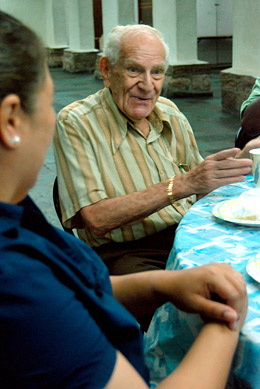A Different Dialogue
As she concludes Mark 13 (”…But be alert; I have already told you everything”) the vicar shuts her Bible, saunters to the front of the altar, and faces her congregation with a smile.
“This is a tough gospel to understand,” she says to the four. “What is Jesus teaching here?”
Sam Fusch, who turns 90 that day, raises a willowy hand and, despite his age, launches animatedly into a fastidious response.
“Jesus says that we must not believe those who attempt to deceive us,” Rev. Selfe voices for him, her keen eyes following his every hand gesture. “He’s telling us not to let others lead us astray, even when they say the Messiah is coming.”
At this, she nods. Two seats to the left, John, 77, begins to gesture his own interpretation. None of them have the text before them. “We must trust Jesus,” he signs. The group is immersed in muted conversation for the next few minutes, soundless and dynamic in its own quiet way; Selfe’s simple question has elicited from her congregation a reflective, interactive dialogue with the text.
For the minister, the heightened intimacy of her services is precisely the form of worship she champions — an access to religion and spirituality of which too many deaf individuals are deprived, she says.
“So much of it is about empowerment,” she explains after the sermon over a slice of Sam’s birthday cake. “A deaf child once asked me, ‘God? What is God?’ Her hearing parents had brought her to church, but she couldn’t experience it. So she thought, ‘God is for hearing people.’”
She pauses, still overwhelmed by the notion. “It makes a huge statement.”
Later, Selfe clarifies the message of the day’s sermon and its particular impact on the deaf. The Scripture tells us clearly that we live in a world of deception, she tells me, and that deception comes in many forms.
“Direct lies are easier to recognize. But what of prejudice? What of the things we fear that cause us to deceive ourselves so we can avoid those fears? My faith is not that I can avoid deception; my faith that is in Christ all things will work for the good. Our hope is not in the things that can deceive us; our hope is in the things we know to be certain.”
Rev. Selfe’s own path to vicar began at Gallaudet University, the renowned school for the hearing impaired in Washington, D.C. Yet throughout her childhood years in central Pennsylvania, Selfe had already sensed within herself an innate affinity toward religion.
“Growing up deaf, I was close to God,” she reflects, instinctively signing along with her words. “I always knew I would be a minister. You feel that He is the only one communicating with you, speaking to you — and you hear nothing else.”
Though she means it figuratively — she hasn’t literally heard God’s word in the form of voices — Selfe says that she’s been told second-hand that some have perceived it aurally.
“I’m told there are, and it’s not my place to judge,” she says.
Born with jaundice, Selfe lost much of her hearing at birth, from a sustained lack of oxygen during blood transfusions. Her subsequent trouble learning speech was falsely attributed to mental retardation until she turned eight, when doctors finally diagnosed her as hearing impaired. Since then, her hearing has gotten progressively worse.
Yet she’s refused to view her inability to hear as a disability. In October 2005, Selfe married her husband Alex Verrone, who is “hard of hearing,” as he says, but entirely capable of speech and fluent in ASL. The two met when Alex, a sign language interpreter, came to St. Ann’s out of an interest in religion as well as the deaf community.
“Deafness is a sociological handicap,” says Alex, who often interprets for Rev. Selfe when she has trouble lip-reading. “Society needs to catch up, and that begins with seeing us as full people. Sure, we have needs, but that’s not a handicap. That’s life.”
To Rev. Selfe, worship without sound has never struck her as a shortcoming. What hearing individuals regard as the traditional and very much aural experience of church — the hymns and choirs — was never a part of her own understanding of spirituality. So, she says, she never missed it.
“If you think about it, what really is worship?” she says. “Is it the tradition of music in church? But if I don’t hear music, it’s not part of my worship. Think of Beethoven; music is in the heart, the mind. I show it through my movements. Hearing people tell me that it adds to the beauty of our services, and some consider it an outward expression of prayer.”
Where she and her fellow congregation lack the perception of sound, they gain the nuances of another language: ASL. Rev. Selfe describes it as being closer to Chinese than English, and Alex clarifies that it’s not so much a language of words as one of “ideas — of concepts and symbols,” he says, struggling to convey the essence of a language foreign to so many. “It’s like sending Morse code through a color TV.”
As in any other language, there are inevitable casualties of translation. It’s why Selfe chooses to sign her own services rather than use an interpreter. She believes that not only is the sermon’s meaning altered when translated word-for-word, but the cardinal element of intimacy between preacher and congregation is ultimately sacrificed.
“You feel freer — like God’s true message is getting across,” says Selfe, who has, remarkably, preached to hearing congregations before coming to St. Ann’s. “There are concepts you can’t explain, or interpret in English. When a deaf person has to look at an interpreter instead of the altar — the priest, the actual person communicating the gospel — they feel somehow excluded.”

